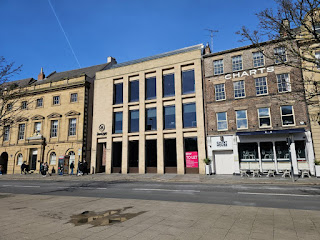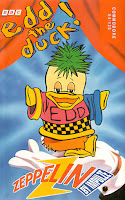25 Osbourne Road, Jesmond, Newcastle upon Tyne, NE2
"The north-east is a bit of a remote outpost for UK software now that Tynesoft has bitten the dust. This last bastion of Geordie publishing specialises in budget software." That's how THE ONE described Zeppelin Games, entry number one in their Software Landmarks of the UK article in October 1991. It's a short entry for a company which ended up being a big player in the UK games industry although I'm not 100% sure the company is still running today. I'll get to that later.
Derek Brewster stopped writing his Adventure Trail column for CRASH in issue 48 (Christmas Special 1987, page 55) [1]:
This issue is Derek Brewster's last as Adventure Trail columnist - the programmer/writer is leaving CRASH to set up a software house and won't have time to breathe, let alone LOOK AROUND.
Derek Brewster was moving on to found Zeppelin games with Tynesoft programmer Brian Jobling and writer Martin O'Donnell. Derek Brewster had a distinguished programming history, writing several very well received ZX Spectrum games for Micromega in 1984. He'd continued programming while writing for CRASH. There was a sequel to one of the Micromega games in 1985, Code Name Mat II, for Domark because Micromega had closed down. A few games for Mastertronic followed in 1986/87 and then, most significantly, in late 1987 Winter Olympiad '88 for Tynesoft. Presumably that's when Derek met Brian Jobling, and Zeppelin Games was born. Although Brian Jobling had also worked at Domark on the Amstrad conversion of Code Name Mat II before going on to program Atari conversions for Tynesoft. I can't find anything on Martin O'Donnell. I'm guessing he's not the American composer who worked on the soundtrack for the Halo trilogy.
73 Forsyth Road, Jesmond, Newcastle upon Tyne, NE2
Companies House records 30 September 1987 as the incorporation date of Zeppelin Games. The business address? Derek Brewster's house in Jesmond, which the Newcastle correspondent for Where Were They Now? assures me is the posh bit of the city. The awesome data collating power of the internet means you can find Derek Brewster's signature on the incorporation document, so if you've ever fancied owning a signed copy of Haunted Hedges it will only take a bit of work in Photoshop. Speaking of data collation/privacy, 73 Forsyth Road is blurred out on Streetview which suggests one of the subsequent residents asked for it to be removed.
Zepplin Games was a budget software house. This was the way the market was heading following the success of Mastertronic and Codemasters. The logistics of launching a budget house were covered by ACE in March 1988, in an article of disappointing legibility (cyan text on a white background, nice one. Hang your head in shame Art Editor Trevor Gilham):
 |
| ACE March 1988 page 11 |
The company plans to bring out four titles per month throughout this year across the popular formats at a price of £2.99. Derek Brewster says they need to sell 10,000 games per month to break even, on the basis of the company receiving around £1.17 per game sold.
Will he make a fortune? Zeppelin hope to sell 20,000 games per month and to have snatched a 5% share of the budget market by the end of '88. That is, they hope to be doing business to the value of £2.5 million.
Budget software needed volume rather than quality to get on the shelves (although it helped to have both). Alongside Zeppelin's first few original titles were re-releases of old games. Originals like Zybex and Draconus bumped shoulders with Derek Brewster's Jasper and Code Name Mat, and Death Chase by fellow Micromega programmer Mervyn Estcourt. Zeppelin also snaffled the rights to late-period Design Design games Forbidden Planet, N.E.X.O.R. and 2112AD (which doesn't seem to have been released) and Realtime Games' 3D Tank Duel, which was renamed the more Codemasters-y Battle Tank Simulator. Zeppelin also followed in Tynesoft's footsteps and wrote games for the Atari 8-bit computers, which were neglected by the bigger publishers. These titles included a conversion of Domark's The Living Daylights. The Design Design games seem to have come via a company called Digital Inspiration. CRASH mentioned them in January 1989 and created a mystery for me:
NEWLY FORMED Digital Inspiration have signed a one-year sales and marketing deal with... Zeppelin Games. Under the agreement, Zeppelin will release a number of old Design Design games... A further connection between the two concerns is that Digital Inspiration also have a 50% stake in Zeppelin's new full-price label, Kognito.
 |
| THE GAMES MACHINE January 1989 page 148 |
25 Osbourne Road, Jesmond, Newcastle upon Tyne, NE2
28 Osbourne Road, Jesmond, Newcastle upon Tyne, NE2
How long did Zeppelin Games operate from Derek Brewster's house? If you look on Companies House, they were there until 24th November 1989 when the registered address changed to 25 Osbourne Road. However, the inlay for one of Zeppelin's earlier games, Frontline for the Spectrum, which was reviewed around June 1988 gives an address of 28 Osbourne Road. Can they both be correct? Sure. Why not.
The later Companies House records include accounts for 1991 (dated 21 Jul 1993). These were compiled by a charter account firm called Cutter & Walton. Their address? 25 Osbourne Road. That's Zeppelin's registered address. Their trading address was 28 Osbourne Road, and in fact there's a line in the 1989 accounts (24 Oct 1990):
The company has expanded its products range and is now renting larger premises in order to meet anticipated future demand.
The expansion referred to there, is a new full price range called Cognito (CRASH misspelt this as Kognito in their report, this was an easy mistake to make because it was kool to exkhange konstonants in the klosing years of the dekade). It was also cool for budget software houses to spin off full price labels even though, counter intuitively, the 8-bit market was heading in the opposite direction. Owning a full price and budget label became quite standard for the big publishers. It allowed them to have both pieces of the pie. A game could be released at full price and then rereleased at budget price without sharing the profit with another company.
The first and possibly last game in the Cognito line was Kenny Dalglish Soccer Manager, released around the summer of 1989. The Spectrum version was programmed by one Derek Brewster. The story of the Cognito line gets hazy almost immediately after this. The Spectrum Computing website lists a total of four games which may not have ever been released; 3D Grand Prix (which did come out at £2.99 on the Zeppelin label, and says Cognito on the loading screen); Kenny Dalglish Football Manager a different game (or is it?), and No Man's Land. It looks like the working relationship with the enigmatic Digital Inspiration was not fruitful and the range stalled. By January 1991 THE ONE was reporting that:
BUDGET software publisher Zeppelin has relaunched its full price Cognito label as Impulze.
Note the S to Z swap. Zuper Zexy!
Around the same time, Zeppelin was also going through some changes. By 1990 Derek Brewster and Martin O'Donnell had both resigned as directors and the company would become a family affair. Companies House records the 1990 list of directors as remaining founder Brian Jobling, plus Paul, John, and Darren Jobling.
I saved myself a 30 minute walk by remembering to check Streetview before leaving my hotel. These days both 25 and 28 Osbourne Road are residential properties, so I wasn't going to photograph them.
9D Ash Way, Houghton-Le-Spring, Durham, DH4
By 1990 Zeppelin has moved out of Newcastle and to Houghton-Le-Spring. A town mid-way between Sunderland and Durham.
Zeppelin settled into an increasingly successful groove across the first half of the nineties. The company supported the Amiga and Atari ST computers and also kept pumping out games for the 8-bit computers as other publishers abandoned them. There's a range of Dizzy-esque games about a ghost called Blinky. There's quirky titles like Turbo Skate Fighter and Kick Box Vigilante and Ninja Commando. And there's lots and lots of licences. But not the big name licences that Ocean and Elite and Domark would scrap over. We're at the Martech end of the market, with licences that were attention grabbing without necessarily costing the earth; Jocky Wilson, Graeme Souness, CBBC's Edd the Duck, Match of the Day, Neighbours, and ITV kid's series Round the Bend.
1994 saw Zeppelin Games catch the attention of American developer Merit Studios. The company was taken over and renamed Merit Studios Europe.
 |
| March 2024 |
 |
| YOUR SINCLAIR June 1990 page 79 |
Metro Centre East Business Park, Waterside Drive, Gateshead, Tyne and Wear, NE11
Metro Centre East Business Park is, unsurprisingly, east of the Gateshead Metro Centre. on a strip of land between the A1 and the river Tyne. It's not exactly waterside. The site is cut off from direct access to the river by the same railway tracks which run along the side of the Addison Industrial Estate, home of Tynesoft, You'll go past both if you take a train from Dunston to Wylam.
The Joblings, in their role as directors, brought the company back from Merit Studios in 1996 with the help of Infogrames. The involvement of Infogrames is normally the death-knell for any UK company but somehow Merit Studios (Europe) Ltd avoided becoming Infogrames Gateshead and instead became the difficult to spell Eutechnyx. They stayed in the Metro Centre East Business Park all the way up to 2016. This was lucky for me because at the end of Waterside Drive are four more or less identical buildings. Which of them housed Eutechnyx?
The one in the middle. This one.
 |
| March 2024 |
 |
| March 2024 |
Who were Digital Inspiration? Can you take a photo of 13707 Gamma Road? Do you know what happened to the release of 2112AD? Send an email to whereweretheynow@gmail.com or leave a comment. I am also on Bluesky @shammountebank.bsky.social and Instagram, shammountebank.









No comments:
Post a Comment